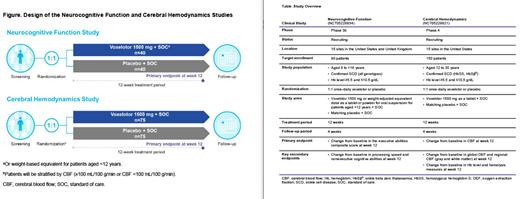Abstract
Background: Sickle cell disease (SCD) is an inherited blood disorder caused by a point mutation in the beta chain of hemoglobin (Hb) that results in the formation of sickle hemoglobin, HbS. Polymerization of HbS under conditions of deoxygenation causes red blood cell sickling that can lead to hemolytic anemia and vascular occlusion with subsequent end-organ damage, infarction, and cognitive dysfunction. In patients with SCD, cerebral blood flow (CBF) is elevated throughout the brain, with silent cerebral infarcts (SCIs) occurring mainly in brain regions with the lowest CBF. SCIs, overt strokes, and cognitive impairment are some of the most common complications of SCD, all of which have a substantial impact on the education, employment, and quality of life of patients with SCD. Cognitive impairment in patients with SCD can also manifest in those without SCI or overt stroke, suggesting a potential role of chronic anemia and cerebral hemodynamics in neurocognitive dysfunction. Despite progress in the development of therapies for SCD, little is known about their effect on cognitive function and cerebral hemodynamics. Voxelotor is a HbS polymerization inhibitor approved in the United States for the treatment of SCD in patients aged ≥4 years and in the United Kingdom, European Union, and the United Arab Emirates for patients aged ≥12 years.
Objective: To understand the impact of voxelotor on brain function in patients with SCD, 2 post-approval studies of voxelotor are currently recruiting and are described here.
Methods: The Neurocognitive Function study (NCT05228834) is a phase 3b, randomized, double-blind, placebo-controlled, multicenter trial investigating the effect of once-daily oral voxelotor (Figure) on neurocognitive function in children and adolescents with SCD. The Cerebral Hemodynamics study (NCT05228821) is a phase 4, randomized, double-blind, placebo-controlled, multicenter trial investigating the impact of once-daily oral voxelotor (Figure) on CBF in adolescents and adults with SCD. An overview of the study population, study design, and key endpoints for both studies is provided in the Table.
Results: The primary objective of the Neurocognitive Function study is to assess the effect of voxelotor compared with placebo on the neurocognitive function in children and adolescents with SCD (aged 8 to <18 years), which will be evaluated by measuring the change from baseline at week 12 in the executive abilities composite score, as assessed by the National Institutes of Health Toolbox Cognition Module. The primary objective of the Cerebral Hemodynamics study is to assess the efficacy of voxelotor compared with placebo on CBF in adolescents and adults (aged 12-30 years) with homozygous hemoglobin S (HbSS) or sickle beta zero thalassemia (HbSβ0), which will be evaluated by assessing the change from baseline in CBF measured by magnetic resonance imaging at week 12.
Conclusions: Treatments that improve neurocognitive dysfunction represent an important unmet need in the management of SCD. Results from the Neurocognitive Function study and the Cerebral Hemodynamics study (the latter will enroll adult patients) will provide important information on the impact that inhibition of HbS polymerization may have on cognitive function and cerebral hemodynamics by improving anemia and hemolysis in patients with SCD.
Funding: Global Blood Therapeutics.
Disclosures
Fields:Global Blood Therapeutics: Consultancy; Proclara Ciosciences: Other: Equity Ownership. Donahue:Global Blood Therapeutics: Consultancy; Pfizer: Consultancy, Other: Advisory Board; Alterity Therapeutics: Consultancy; LymphaTouch: Consultancy; Novartis: Other: Advisory Board; Biosight LLC: Current Employment, Other: President and CEO. Davis:Global Blood Therapeutics: Current Employment. Cisneros:Global Blood Therapeutics: Current Employment. Bell:Global Blood Therapeutics: Current Employment. Purdie:Global Blood Therapeutics: Current Employment, Current equity holder in publicly-traded company. Meier:Global Blood Therapeutics: Current Employment. King:Global Blood Therapeutics: Consultancy, Research Funding.
Author notes
Asterisk with author names denotes non-ASH members.


This feature is available to Subscribers Only
Sign In or Create an Account Close Modal